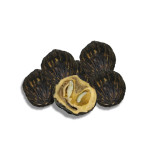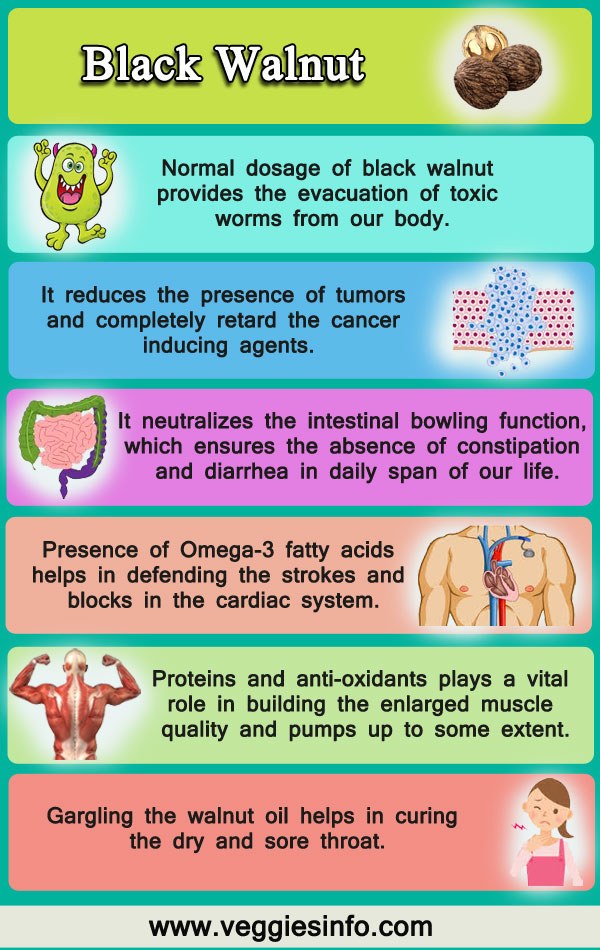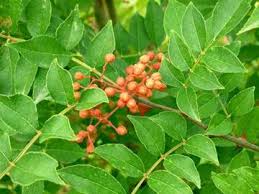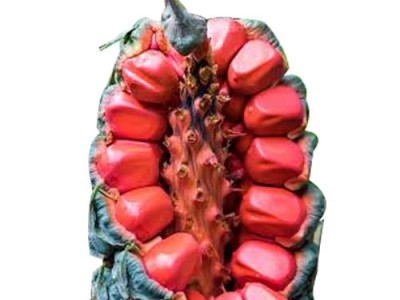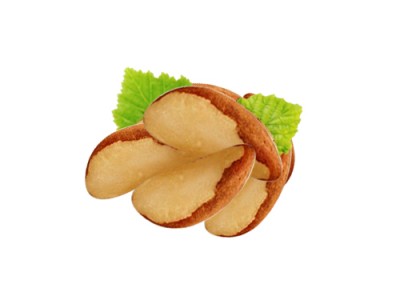
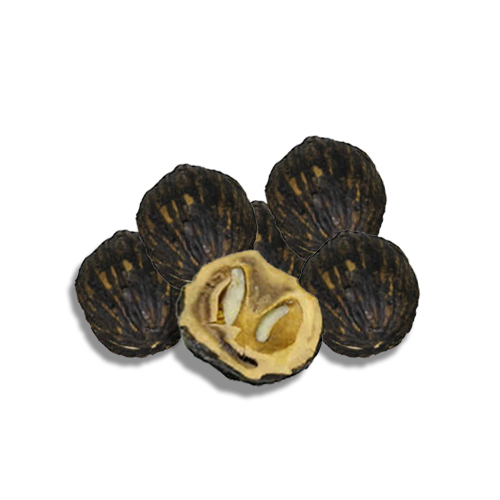
Black Walnut Organic Facts & Healthy Eating
Black Walnut
Black walnut is botanically named as Juglans nigra. It comes under the walnut family which belongs to the flowering plant. Its native is near North America and extends up to Texas, Florida, Georgia, Southern Ontoria and in larger parts of Riparian sector. It is a largest tree in the forest which reaches nearly 30-40 meters height and a broad trunk with a wide crown which provides the shelter for many living beings. It is having the hard blackish grey colored bark which is completely crumpled. The leaves are pinnate in the odd form which counts nearly 17-23 in a single leaf.
The length of the leaf is around 7-10 cm and the breadth is approximately 3-5cm. Both male and female parts are isolated in the same flower whereas the male part occupies the entire flower with end of the stamens as female part. This combined form creates the pale green colored fleshy fruit in the late autumn with a crumpled nut inside. The seeds are comparatively very small and the entire fruit gets ripened and falls at the season of October. Most probably it is not a self pollinating plant and hence it requires one more plant for the reproduction of a new plant. Black walnuts easily get breaded with other species of the juglans genus.
The life stretch of this black walnut tree is around 130years and it starts to yield fruits at the 4th year from planted and moreover it takes 20 years for obtaining a matured fruit. Black walnut tree requires enough sunlight to produce the effective growth and harvesting of seeds. For this reason these trees are planted at the road sides of United States. This is completely contrary to the frost and other mind freezing climatic conditions.
Extraction Of Black Walnut
The black walnut is extracted when it is yet to be ripened. Simply, when it was green in color it gets harvested and soaked in warm water to remove the outer hull. Then the hard outer shell of the nut is processed in various stages for getting a fleshy fruit.
It is very much popular in the people among both the European and Americans. Black walnut is reputedly used as an antiseptic agent like tincture. It is rich in protein and other edible fatty acids which made it to stand outside for its balanced splendid properties. The natural flavor of black walnut tastes better when used as a topping in the desserts and ice creams. It is more specifically unique in their organic facts and nutritional value. Let us explore briefly about the black walnut.
Medicinal Aspects
- Black walnuts are used for agricultural and various medicinal fields.
- Americans used shell of the walnut as a hair coloring dye.
- It is very much rich in unsaturated Fatty acids and Proteins.
- Proteins and anti-oxidants plays a vital role in building the enlarged muscle quality and pumps up to some extent when it is taken as prescribed by the practitioner.
- Also the amino acid content food can be added to this walnut to prevent some restrictive diet. It contains linolenic and stearic acids which regulates the furnishing of the entire nut quality.
- Walnuts are helpful in increasing the immunity level.
- Gargling the walnut oil helps in curing the dry and sore throat.
- Some antifungal and antiseptic agents are extracted from the black walnuts. It also acts as a medicine for treating ulcers and intestinal wounds.
- When walnut is taken in along with the some other medicines, it reduces the effectiveness of that particular aspect.
- Notably these juglones are acting as an anti-carcinogenic agent, which reduce the presence of tumors and completely retard the cancer inducing agents.
- It controls the blood sugar level and vanish the bad cholesterol content.
- Presence of Omega-3 fatty acids helps in defending the strokes and blocks in the cardiac system.
- Effective value of the black walnut neutralizes the intestinal bowling function, which ensures the absence of constipation and diarrhea in daily span of our life.
- Walnuts are mainly indulged in regulating the digestive system.
- The powdered walnuts are predominantly used for skin toning anti-blemishing agent, when applied as a paste.
- Presence of tannin and juglone acts as an anti-fungal agent, which completely defend us from the fungal attack.
- Normal dosage of black walnut provides the evacuation of toxic worms from our body.
- The outer shells are used for polishing the decorative and ornamental materials. Also it is used for filtration process.
Nutritional Value
| Principle | Nutrient Value | Percentage of RDA |
|---|---|---|
| Energy | 654 Kcal | 33% |
| Carbohydrates | 13.71 g | 11% |
| Protein | 15.23 g | 27% |
| Total Fat | 65.21 g | 217% |
| Cholesterol | 0 mg | 0% |
| Dietary Fiber | 6.7 g | 18% |
| Vitamins | ||
| Folates | 98 µg | 24% |
| Niacin | 1.125 mg | 7% |
| Pantothenic acid | 0.570 mg | 11% |
| Pyridoxine | 0.537 mg | 41% |
| Riboflavin | 0.150 mg | 11.5% |
| Thiamin | 0.341 mg | 28% |
| Vitamin A | 20 IU | 0.5% |
| Vitamin C | 1.3 mg | 2% |
| Vitamin E-γ | 20.83 mg | 139% |
| Vitamin K | 2.7 µg | 2% |
| Electrolytes | ||
| Sodium | 2 mg | 0% |
| Potassium | 441 mg | 9% |
| Minerals | ||
| Calcium | 98 mg | 10% |
| Copper | 1.5 mg | 167% |
| Iron | 2.9 mg | 36% |
| Magnesium | 158 mg | 39.5% |
| Manganese | 3.4 mg | 148% |
| Phosphorus | 346 mg | 49% |
| Selenium | 4.9 µg | 9% |
| Zinc | 3.09 mg | 28% |
| Phyto-nutrients | ||
| Carotene-ß | 12 µg | — |
| Crypto-xanthin-ß | 0 µg | — |
| Lutein-zeaxanthin | 9 µg | — |
Negative Role Of Black Walnut
Preferably the pregnant and breast feeding women are suggested not to take any of the products from Black walnut because of their allergic characteristics.
The presence of tannin is somewhat toxic. Intake of more walnut leads to complete absorption of food materials present in the stomach and intestine.
The juglones are mainly generated at the roots of black walnut, which are highly toxic to other plants nearer to its root system. Juglone is present in all the parts of black walnut which are comparatively less than the roots have.
Juglone mainly reduces the protein bonding in our body which seems to damage our DNA ligase and leads to prompt damages in our cell.
Prolonged consumption of black walnut leads to no side effects but when applied on the dry skin is not safe, because of the presence of a chemical named as juglone which is highly specified as an inducing agent for lip and mouth cancer.
It is a nut with high fat content in it and should be avoided by low fat diet people.
Possibly the walnuts should not be taken in whole, but less than twice is preferably good.

